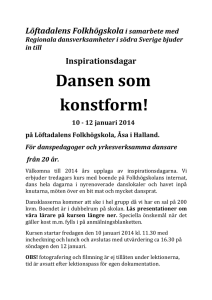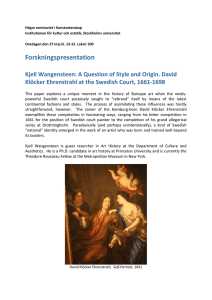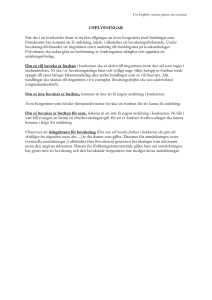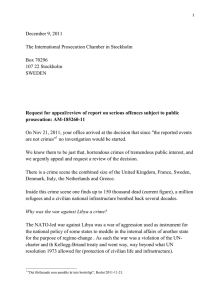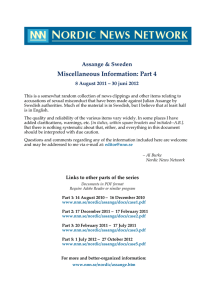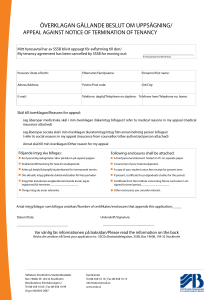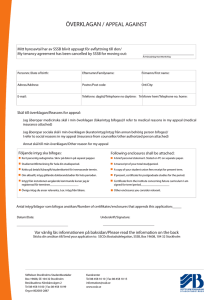Report concerning the detention of Julian Assange
advertisement
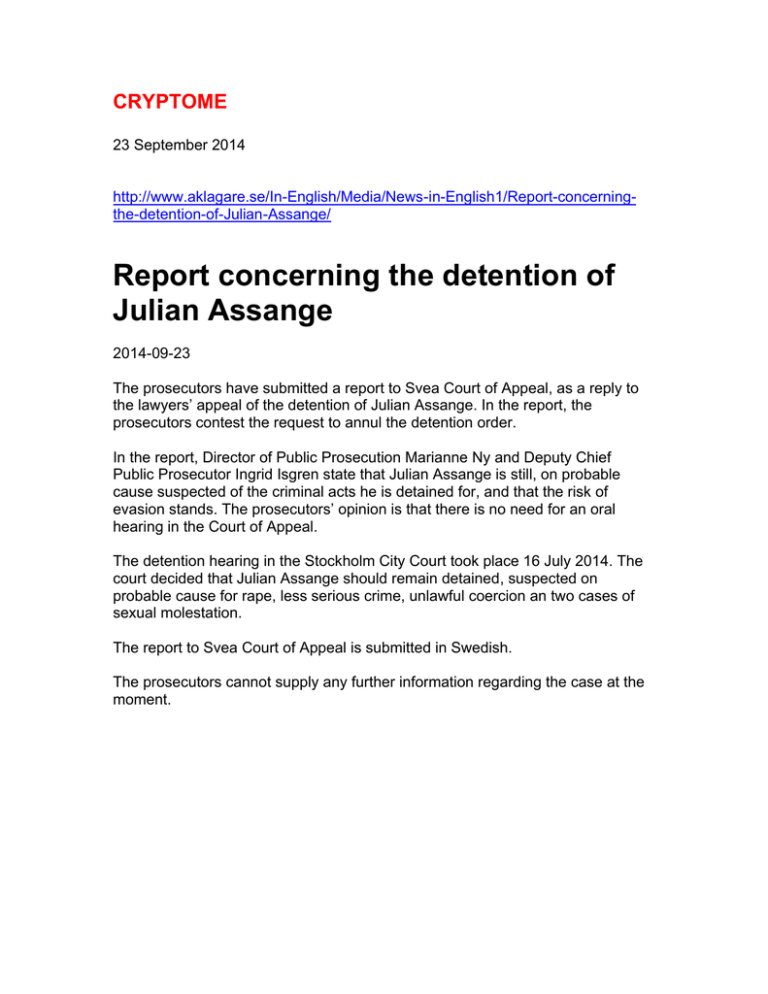
CRYPTOME 23 September 2014 http://www.aklagare.se/In-English/Media/News-in-English1/Report-concerningthe-detention-of-Julian-Assange/ Report concerning the detention of Julian Assange 2014-09-23 The prosecutors have submitted a report to Svea Court of Appeal, as a reply to the lawyers’ appeal of the detention of Julian Assange. In the report, the prosecutors contest the request to annul the detention order. In the report, Director of Public Prosecution Marianne Ny and Deputy Chief Public Prosecutor Ingrid Isgren state that Julian Assange is still, on probable cause suspected of the criminal acts he is detained for, and that the risk of evasion stands. The prosecutors’ opinion is that there is no need for an oral hearing in the Court of Appeal. The detention hearing in the Stockholm City Court took place 16 July 2014. The court decided that Julian Assange should remain detained, suspected on probable cause for rape, less serious crime, unlawful coercion an two cases of sexual molestation. The report to Svea Court of Appeal is submitted in Swedish. The prosecutors cannot supply any further information regarding the case at the moment. Google translation of the Swedish opinon: https://translate.google.com/translate?sl=sv&tl=en&js=y&prev=_t&hl=en&ie=UTF -8&u=http%3A%2F%2Fwww.aklagare.se%2FPageFiles%2F13851%2FAM131226-10_%25c3%2596YT_40116460_20140923090131.pdf&edit-text= Page 1 Side 1 (7) Söderorts Public Prosecution Office in Stockholm OPINION Handling 181 Subject AM-131226-10 Marianne Ny 2014-09-23 Administrator 105-75 Deputy Chief Prosecutor Ingrid Isgren Svea Court of Appeal Box 2290 103 17 STOCKHOLM Goal E 8290-14, Rotel 0102 Julian Assange ./. District Attorney about rape, etc.; Now ask about arrest Opinion We dispute the claim that the Court of Appeal should rescind the decision on arrest of Julian Assange in his absence. We have especially been submitted to express ourselves in four respects. Our answers are developed closer to the basics. The first is lacking in our opinion, reason to hold an oral hearing. The defense has been writing extensively developed argument and the district court minutes of the trial reflects how well both parties oral arguments orally. 2 We reject Julian Assange's request to give the printing of plaintiffs B's SMS to the Court of Appeal. The defense has had access to material repeatedly, under arrest negotiations and at agreed times with the police. The content is well described in the district court's record of the hearing on 16 juli in 2014. 3. Annex 1 to the appeal in its entirety and the plaintiff's name Annex 4 is a confidentiality pursuant to Chapter 18 § 1 and 35 of Chapter 1 and 12 §§ Publicity and Secrecy (2009: 460). However, we have had note that several posts on a well-known online forums on Saturday 13 September 2014 links to a page where the appeal with attachments published in its entirety. In the thread where posts published discussion theories of conspiracies against Julian Assange. 4 We maintain our view that interrogation with Assange and implementation of the physical examination, known as the tops tion of him in England not effectively would drive the investigation forward and lead that any prosecution here can be implemented. Address Street Address Telephone Email Box 1194 141 24 HUDDINGE Bear Kullavägen 7 010-562 50 00 Fax 010-562 57 99 registrator.aksoderortstockholm@aklagare.se Web Address www.aklagare.se Page 2 Söderorts Public Prosecution Office in Stockholm Side 2 (7) Handling 181 Subject AM-131226-10 Marianne Ny 2014-09-23 Administrator 105-75 Deputy Chief Prosecutor Ingrid Isgren Basics The district court's decision is correct and should be determined First probable cause For the statements of the probable reasons given in häktningsmemorandum dated November 5, 2010, the annex to the district court's protocol, dated 18 November 2010, and our opinion, dated July 1, 2014, and in Annex to the district court's records, dated July 16, 2014, we want to make the following additions. Objective conditions Julian Assange claims that the objective conditions for the act rape, less serious crime, do not exist. Nothing has changed in that matter since Svea Court first examined question on 22-24 November 2010 (E 9363-10). Court of Appeal's decision was appealed Julian Assange and the Supreme Court decided on 2 December 2010 do not let him leave to appeal (E 5474-10). The description of the offense which was the subject of Svea Court trial is still relevant. The behavior that Julian Assange is suspected of constituting In our view, objectively a rape, less rough. Text even relevant to the assessment of probable cause In the above Annexes describes the content of the SMS, which may be of interest in assessing whether probable cause exists for the offense. Plaintiff's intention with text and a Julian Assange's view of how these SMS be interpreted and assessed in the annex to our opinion to the district court and of the district court's protocol attachment. In summary, we believe that it still exists probable cause for the works that Julian Assange is in custody for. 2nd Special arrest reason - escape danger The defense has repeated the substantially inaccurate description of the way the investigation was conducted and on what steps it has taken to get to stalls hearing of Julian Assange in Sweden in autumn 2010 as one submitted in the petition to the district court. These allegations were addressed in our opinion to Stockholm District 2014-07-01. Please refer to the explanation of facts provided in our opinion pages 2-3. We would like to draw particular attention that in contacts with the defense made clear there were investigative actions Page 3 Söderorts Public Prosecution Office in Stockholm Side 3 (7) Handling 181 Subject AM-131226-10 Marianne Ny 2014-09-23 Administrator 105-75 Deputy Chief Prosecutor Ingrid Isgren to be taken in connection with the investigation resumed on 1 September 2010, and that these need to be taken before it was necessary to hold hearings with Julian Assange. We would also refer to the statement of the facts conditions, which were left in the prosecutors' opinion, dated 22 November 2010, Svea Court goals Ö 9363-19. Julian Assange does not intend to comply with the ruling of the Supreme Court on his surrender to Sweden is also evident from what is stated in the Appeal scripture. Risk of flight remains undiminished. 3rd of purpose and the needs of law and the issue of proportionality The principle of purpose means a restraint shall be used only for those in legislation stated purposes. The arrest of Julian Assange who has not appeared aims to prevent Julian Assange deviates or absconds prosecution or punishment for the aforementioned crimes. The object is within the for the current forced agent application. Buyers principle a restraint shall not be resorted to only if there is a substantial need of coercion agent and if the intended result can not be achieved with other less restrictive means. When the decision to arrest Julian Assange in absentia September 27, 2010 was taken, it was clear that there was escape danger. It was already previously unknown where he was staying. Attempts to identify where he was staying as well as failed attempts to get him to come in for questioning. It was not possible to achieve the result by less intervention measures, such as subpoenas or travel bans and notification requirements. While continuing attempts during the fall of 2010 to clarify he was there as well as the attempts to voluntarily get him to come to questioning in Sweden failed. It appeared at the time of Julian Assange was requested under arrest in absentia is not likely that he remained in Sweden. There was therefore a clear need for coercive means to implement investigation and ensure a possible prosecution. The estimation that there is a real need to Julian Assange is arrested in absentia for to achieve the intended results. The principle of proportionality means that the nature, intensity, scope and duration of the intervention should be proportionate to the desired objective. In RB Chapter 24, § 1 states that more closely so that the grounds for detention must outweigh the interference and but otherwise the measure means for the suspect or any other conflicting interest. The principle of proportionality is of increasing importance the longer the detention lasts. In the present case has arrest warrant is not executed. The question is how and to what extent of the elapsed time should be considered and the extent to which they Page 4 Söderorts Public Prosecution Office in Stockholm Side 4 (7) Handling 181 Subject AM-131226-10 Marianne Ny 2014-09-23 Administrator 105-75 Deputy Chief Prosecutor Ingrid Isgren liberty restrictions that Julian Assange has experienced during the process of his surrender under a European arrest warrant going to be considered. We fully share the district court's judgment on the issue of proportionality and refers to the district court protocol pages 5-7. We also refer to our opinion dated July 1, 2014, pages 5-6. However, we will comment specifically on the following issues: Is Julian Assange's existence at the embassy tantamount to freedom deprivation? Julian Assange claims that the conditions under which he lives inside on Ecuador's embassy represents a detention under the ECHR practice. In support of this argument, he cites three cases from ECtHR (see p.3 of appeal dated 12 September 2014),. Common to the alleged legal cases is that they describe different kinds of restrictions on their freedom as a state of the vulnerability for. Julian Assange has himself chosen to seek the Ecuadorian embassy and to remain there. He is able to choose if and when he wants to leave the embassy. He stay on Embassy can not be said to constitute a deprivation of liberty and the alleged legal cases are in our view not relevant here. Ecuador's decision on asylum Ecuador, according to the documents attached to the appeal made assessments tion that Julian Assange meet the criteria of the UN Refugee Convention and granted him asylum in order to protect him from political persecution. He has however, not been granted asylum by Ecuador to evade investigation and prosecution of the crimes he is suspected in Sweden. Political asylum does not even in the country which granted asylum criminal immunity for other types of crimes refugee may have committed or are about to commit. Defense relies on certain materials to show that Julian risk Such political persecution in the United States as a result of their activities in the Wikileaks that he has been granted asylum for claiming that he is at risk of extradition to USA on surrender to Sweden from the UK would be enforced. It may seem like a far-fetched idea that the United States since 2010 was awaited to take legal action to bring about an extradition opportunity and sense to be able to address its request to Sweden instead of the UK. This particular as a decision on extradition to the United States from Sweden, all provided that this would be allowed under Swedish law, also would require a approval from the UK. Page 5 Söderorts Public Prosecution Office in Stockholm Side 5 (7) Handling 181 Subject AM-131226-10 Marianne Ny 2014-09-23 Administrator 105-75 Deputy Chief Prosecutor Ingrid Isgren The question of the impediments to enforcement? Following that Julian Assange is staying at the Ecuadorian embassy in London Britain has not been able to execute the lawfully made the decision on his surrender to Sweden. The defense has declared that Julian Assange does not intend to leave the embassy if he risks handing over to Sweden and do claim that this is an enforcement. Julian Assange has taken his refuge in Ecuador's embassy and which enjoys the patronage means a temporary enforcement. However, in our opinion, is not in itself a sufficient reason to cancel the arrest warrant. The question is, in our opinion rather than a matter of it can still be considered proportionate to uphold the detention order and thus the issued EAW. As shown in our opinion to the district court we believe that the reasons for detention, in light of the seriousness of the crimes Julian Assange is suspected and the limited restriction of liberty he already been subject to outweigh the intrusion or other detriment that the action means for him or for any other conflicting interest. The purpose of the coercive measure to ask Julian Assange arrested in absentia is to investigate the crimes Assange is suspected and to ensure that a possible prosecution to take place. This has been no departure from either out of need or purpose principle. 4th issue of holding interviews with Julian Assange in Britain We have in our opinion dated July 1, 2014 accounted for our consideration and positions on this issue. We would additionally states the following. When Julian Assange was requested custody in absentia, it was unknown where Julian Assange was. Under such circumstances, it was only a European Arrest Warrant (EAW) with personal ad that could be considered, all provided that offenses penalty was high enough to measure could be justified. It should however be noted that even if His whereabouts had been known that with regard to the crimes he is suspected of been necessary to first choose to try international legal assistance in Criminal. In addition to bringing about the investigation measures at issue were also a need to ensure a possible prosecution. Penalty value of the offenses also clearly exceeded what was required. Only after a European arrest warrant requesting his surrender to Sweden and ad issued by him, it became known that Julian Assange was in London. During the time that the process surrounding Page 6 Söderorts Public Prosecution Office in Stockholm Side 6 (7) Handling 181 Subject AM-131226-10 Marianne Ny 2014-09-23 Administrator 105-75 Deputy Chief Prosecutor Ingrid Isgren handover took place in Britain, it was not necessary to operate in parallel another legal procedure. The issue of legal assistance first arose a time after Julian Assange in June 2012 evaded the execution of the The Supreme Court finally made his surrender to Sweden. Assistance in the UK can only be done through voluntary forms, ie the entire procedure is based on the suspect involved and agrees to the actions to be taken, an agreement that also can be revoked. It is not possible to compulsorily enforce whether decisions about bodily (Eg DNA swab tion for the comparison of traces found at a crime scene) or implementation of interrogation. A suspect would also be able to refuse to let to be served under Chapter 23, § 18 Code of Judicial Procedure. The same difficulties can make themselves current while trying to serve summons and notice of hearing. It is uncertain to what extent voluntary participation can be expected in the present case. The nature of the investigation data and the requirements on the quality of investigations of sexual offenses cases makes the crime of less well-suited for a proceeding with legal assistance and interrogation at a distance, especially in cases like this, when of examination and other investigative measures on the suspect. Against this background, we have determined that body examination and interrogation with Julian Assange in Britain would lead the investigation forward effectively. A factor also weighs heavily is that legal assistance in criminal cases would not ensure that a trial can be conducted at a possible prosecution. We have continuously over the past two years, considering the conditions for and the practical ability to hold hearings and let the other necessary investigative measures in the UK. We have in addition to examine the details conditions, however, found no reason to go ahead and take practical steps to bring about such questioning or physical examination. 5 Procedural questions Should a hearing in the Court of Appeal held? As we noted above, we believe that both parties fully developed its action writing and in the district court also orally. The District Court's record of detention hearing reflects how well both parties presented oral argument. They only reasons we from prosecution believes speaks to hold an oral hearing in the Court of Appeal is that it gives the Court of Appeal the opportunity to take part in all the SMS that the district court had to take part of the hearing on 16 July 2014, we believe, however (see the second paragraph on page 2) that the written material which the Court of Appeal available to provide sufficient evidence to determine whether probable cause exists. Page 7 Söderorts Public Prosecution Office in Stockholm Side 7 (7) Handling 181 Subject AM-131226-10 Marianne Ny 2014-09-23 Administrator 105-75 Deputy Chief Prosecutor Ingrid Isgren We therefore denies that there is reason for the Court of Appeal to hold an oral hearing. Reasons for not giving the text a court of appeal SMS messages are part of the investigation that not Assange consulted against yet. Moreover, the plaintiff for sensitive data. The goal has has attracted considerable media interest and all the documents handed over to Julian Assange and / or courts, in a for us unknown thus, been published on the Internet. Plaintiffs Throughout investigation have been subjected to harassment. It referred to here are completely recently been exposed to someone wrongly managed to get personal information about her from one agency and then posted them on the Internet. There is therefore compelling reason for current text to be kept confidential pursuant to Chapter 18 § 1 and 35 of Chapter 1 and 12 §§ Publicity and Secrecy (2009: 460). Against this background, we oppose Julian Assange's request to SMS shall be submitted to the Court of Appeal. Translation of documents into English No basis for requesting that all documents are translated into English has not specified. Arrest Protocol dated 24 November 2010, translated into English in the context of the process in England and can be submitted to defense. There is no obligation to translate the opinion that we delivered to District Court and Court of Appeal should not rest with the prosecutors. Evidence No evidence offered on the issue of detention. Processing We are asking for written notices. Marianne Ny Ingrid Isgren Söderorts åklagarkammare i Stockholm YTTRANDE Överåklagare Marianne Ny Vice chefsåklagare Ingrid Isgren 2014-09-23 Sida Handling Ärende Handläggare 1 (7) 181 AM-131226-10 105-75 Svea hovrätt Box 2290 103 17 STOCKHOLM Mål Ö 8290-14, rotel 0102 Julian Assange ./. allmän åklagare angående våldtäkt m.m.; nu fråga om häktning Yttrande Vi bestrider yrkandet att hovrätten ska häva beslutet om häktning av Julian Assange i hans utevaro. Vi har särskilt förelagts att yttra oss i fyra avseenden. Våra svar utvecklas närmare under grunderna. 1. Det saknas enligt vår uppfattning skäl att hålla en muntlig förhandling. Försvaret har skriftligen utförligt utvecklat sin talan och tingsrättens protokoll från huvudförhandlingen speglar väl hur båda parter utvecklade sin talan muntligen. 2. Vi motsätter oss Julian Assanges begäran om att ge in utskrift av målsägande B:s SMS till hovrätten. Försvaret har fått ta del av materialet vid upprepade tillfällen, under häktningsförhandlingarna och vid överenskomna tillfällen hos polisen. Innehållet beskrivs väl i tingsrättens protokoll från förhandlingen den 16 juli 2014. 3. För bilaga 1 till överklagandet i dess helhet och för målsägandens namn i bilaga 4 finns behov av sekretess enligt 18 kap 1 § och 35 kap 1 och 12 §§ Offentlighets- och sekretesslag (2009:460). Vi har dock tvingats konstatera att flera inlägg på ett välkänt nätforum lördagen den 13 september 2014 länkar till en sida där överklagandet med bilagor publicerats i sin helhet. I den tråd där inläggen publicerats diskuteras teorier om konspirationer mot Julian Assange. 4. Vi vidhåller vår uppfattning att förhör med Julian Assange och genomförande av kroppsbesiktning, s.k. topsning av honom i England inte på ett effektivt sätt skulle driva förundersökningen vidare och leda till att en eventuell lagföring här kan genomföras. Postadress Gatuadress Telefon E-post Box 1194 141 24 HUDDINGE Björnkullavägen 7 010-562 50 00 registrator.aksoderortstockholm@aklagare.se Telefax 010-562 57 99 Webbadress www.aklagare.se Söderorts åklagarkammare i Stockholm Överåklagare Marianne Ny Vice chefsåklagare Ingrid Isgren 2014-09-23 Sida Handling Ärende Handläggare 2 (7) 181 AM-131226-10 105-75 Grunder Tingsrättens beslut är riktigt och bör fastställas 1. Sannolika skäl Till de redovisningar av de sannolika skälen som återfinns i häktningspromemorian daterad den 5 november 2010, bilagan till tingsrättens protokoll, daterat den 18 november 2010 och vårt yttrande, daterat den 1 juli 2014, samt i bilagan till tingsrättens protokoll, daterat den 16 juli 2014 vill vi göra följande tillägg. Objektiva förutsättningar Julian Assange gör gällande att de objektiva förutsättningarna för gärningen våldtäkt, mindre grovt brott, inte föreligger. Inget har i den delen förändrats sedan Svea hovrätt första gången prövade frågan den 22-24 november 2010 (Ö 9363-10). Hovrättens beslut överklagades av Julian Assange och Högsta domstolen beslutade den 2 december 2010 att inte meddela honom prövningstillstånd (Ö 5474-10). Den beskrivning av gärningen som var föremål för Svea hovrätts prövning är fortfarande aktuell. Det agerande som Julian Assange misstänks för utgör enligt vår uppfattning objektivt sett en våldtäkt, mindre grov. SMS:ens betydelse för bedömning av sannolika skäl I de ovan nämnda bilagorna redogörs för innehållet i de SMS, som kan vara av intresse för bedömning av om sannolika skäl för gärningarna föreligger. Målsägandens avsikt med SMS:en och Julian Assanges syn på hur dessa SMS ska tolkas och bedömas framgår av bilagan till vårt yttrande till tingsrätten och av tingsrättens protokollsbilaga. Sammanfattningsvis anser vi att det alltjämt föreligger sannolika skäl för de gärningar som Julian Assange är häktad för. 2. Särskilda häktningsskäl – flyktfara Försvaret har upprepat den på väsentliga punkter felaktiga redogörelse för det sätt utredningen bedrivits på och för vilka åtgärder som vidtagits för att få till stånd förhör med Julian Assange i Sverige under hösten 2010 som man lämnade i inlagan till tingsrätten. Dessa påståenden bemöttes i vårt yttrande till Stockholms tingsrätt 2014-07-01. Vi vill hänvisa till den redogörelse för sakförhållandena som lämnades i vårt yttrande sid 2-3. Vi vill här särskilt peka på att det i kontakter med försvaret gjordes klart det fanns utredningsåtgärder Söderorts åklagarkammare i Stockholm Överåklagare Marianne Ny Vice chefsåklagare Ingrid Isgren 2014-09-23 Sida Handling Ärende Handläggare 3 (7) 181 AM-131226-10 105-75 som skulle vidtas i anslutning till att förundersökningen återupptagits den 1 september 2010 och att dessa måste vidtas innan det var aktuellt att hålla förhör med Julian Assange. Vi vill vidare hänvisa till den redogörelse för de faktiska förhållandena, som lämnades i åklagarnas yttrande, daterat den 22 november 2010, Svea hovrätts mål Ö 9363-19. Att Julian Assange inte avser att följa utslaget i Supreme Court om hans överlämnande till Sverige framgår också av vad som anförs i överklagandeskriften. Flyktfaran kvarstår oförminskad. 3. Ändamåls- och behovsprincipen samt frågan om proportionalitet Ändamålsprincipen innebär att ett tvångsmedel får användas enbart för de i lagstiftningen angivna syftena. Häktningen av Julian Assange i hans utevaro syftar till att förhindra att Julian Assange avviker eller håller sig undan lagföring eller straff för tidigare nämnda brott. Ändamålet ligger inom ramen för det aktuella tvångsmedlets tillämpningsområde. Behovsprincipen innebär att ett tvångsmedel får tillgripas bara om det finns ett påtagligt behov av tvångsmedlet och om det avsedda resultatet inte kan uppnås med andra mindre ingripande medel. När beslutet att anhålla Julian Assange i sin frånvaro den 27 september 2010 togs var det uppenbart att det förelåg flyktfara. Det var redan sedan tidigare okänt var han uppehöll sig. Försöken att klarlägga var han vistades misslyckades liksom försöken att få honom att komma till förhör. Det var inte möjligt att uppnå resultatet genom mindre ingripande åtgärder såsom hämtning till förhör eller reseförbud och anmälningsplikt. Även de fortsatta försöken under hösten 2010 att klarlägga var han fanns liksom försöken att på frivillig väg få honom att komma till förhör i Sverige misslyckades. Det framstod vid tidpunkten då Julian Assange begärdes häktad i sin frånvaro inte som sannolikt att han fanns kvar i Sverige. Det fanns därför ett påtagligt behov av tvångsmedlet för att kunna genomföra utredningen och säkerställa en eventuell lagföring. Bedömningen kvarstår att det finns ett påtagligt behov av att Julian Assange är häktad i sin frånvaro för att nå det avsedda resultatet. Proportionalitetsprincipen innebär att arten, styrkan, räckvidden och varaktigheten av ingripandet ska stå i rimlig proportion till det önskade målet. I RB 24 kap 1 § preciseras detta närmare så att skälen för häktning måste uppväga det intrång och men i övrigt som åtgärden innebär för den misstänkte eller något annat motstående intresse. Proportionalitetsprincipen får allt större betydelse ju längre tid ett frihetsberövande varar. I nu aktuellt fall har häktningsbeslutet inte verkställts. Frågan är istället på vilket sätt och i vilken omfattning den tid som gått ska beaktas och i vilken utsträckning de Söderorts åklagarkammare i Stockholm Överåklagare Marianne Ny Vice chefsåklagare Ingrid Isgren 2014-09-23 Sida Handling Ärende Handläggare 4 (7) 181 AM-131226-10 105-75 frihetsinskränkningar som Julian Assange fått vidkännas under processen om hans överlämnande enligt europeisk arresteringsorder pågått ska beaktas. Vi delar helt tingsrättens bedömning i frågan om proportionalitet och hänvisar till tingsrätten protokoll sidorna 5-7. Vi vill även hänvisa till vårt yttrande daterat den 1 juli 2014, sidorna 5-6. Vi vill dock särskilt kommentera följande frågor: Är Julian Assanges tillvaro på ambassaden att likställa med ett frihetsberövande? Julian Assange har gjort gällande att de förhållanden under vilka han lever inne på Ecuadors ambassad utgör ett frihetsberövande enligt Europadomstolens praxis. Till stöd för denna uppfattning har han åberopat tre rättsfall från Europadomstolen (se s.3 i överklagandet daterat den 12 september 2014). Gemensamt för de åberopade rättsfallen är att de beskriver olika typer av frihetsinskränkningar som en stat utsatt en individ för. Julian Assange har själv valt att uppsöka Ecuadors ambassad och att stanna kvar där. Han har möjlighet att själv välja om och när han vill lämna ambassaden. Han vistelse på ambassaden kan därför inte sägas utgöra ett frihetsberövande och de åberopade rättsfallen är enligt vår uppfattning inte relevanta här. Ecuadors beslut om asyl Ecuador har enligt de dokument som bifogats överklagandet gjort bedömningen att Julian Assange uppfyller kriterierna i FN:s flyktingkonvention och beviljat honom asyl för att skydda honom från politisk förföljelse. Han har däremot inte beviljats asyl av Ecuador för att undgå utredning och lagföring av de brott han misstänks för i Sverige. Politisk asyl innebär inte ens i det land som beviljat asylen en straffrättslig immunitet för andra typer av brott som flyktingen kan ha begått eller komma att begå. Försvaret har åberopat visst material för att visa att Julian Assange riskerar sådan politisk förföljelse i USA till följd av sin verksamhet inom Wikileaks som han beviljats asyl för och gjort gällande att han löper risk att utlämnas till USA om överlämnandet till Sverige från Storbritannien skulle komma att verkställas. Det kan framstå som en långsökt tanke att USA sedan 2010 skulle avvaktat med att vidta rättsliga åtgärder för att få till stånd en utlämning i akt och mening att kunna rikta sin begäran till Sverige istället för till Storbritannien. Detta särskilt som ett beslut om vidareutlämning till USA från Sverige, allt under förutsättning att detta vore tillåtet enligt svensk rätt, även skulle kräva ett godkännande från Storbritannien. Söderorts åklagarkammare i Stockholm Överåklagare Marianne Ny Vice chefsåklagare Ingrid Isgren 2014-09-23 Sida Handling Ärende Handläggare 5 (7) 181 AM-131226-10 105-75 Frågan om verkställighetshinder? Till följd av att Julian Assange uppehåller sig på Ecuadors ambassad i London har Storbritannien inte kunnat verkställa det lagligen fattade beslutet om hans överlämnande till Sverige. Försvaret har förklarat att Julian Assange inte avser att lämna ambassaden om han riskerar överlämnande till Sverige och gör gällande att detta är ett verkställighetshinder. Att Julian Assange har tagit sin tillflykt till Ecuadors ambassad och där åtnjuter beskydd innebär ett temporärt verkställighetshinder. Det är dock enligt vår uppfattning i sig inte ett tillräckligt skäl för att häva häktningsbeslutet. Frågan är enligt vår uppfattning istället en fråga om det fortfarande kan anses proportionerligt att upprätthålla häktningsbeslutet och därmed den utfärdade europeiska arresteringsordern. Såsom framgår av vårt yttrande till tingsrätten anser vi att skälen för häktning, mot bakgrund av de allvaret i de brott som Julian Assange misstänks för och den begränsade frihetsinskränkning han redan varit föremål för uppväger det intrång eller men i övrigt som åtgärden innebär för honom eller för något annat motstående intresse. Syftet med tvångsåtgärden att begära Julian Assange häktad i sin utevaro är att utreda de brott som Julian Assange misstänks för och för att säkerställa att en eventuell lagföring ska kunna ske. Det har här inte gjorts något avsteg från vare sig behovs- eller ändamålsprincipen. 4. Frågan om att hålla förhör med Julian Assange i Storbritannien Vi har i vårt yttrande daterat den 1 juli 2014 redogjort för våra överväganden och ställningstaganden i den här frågan. Vi vill därutöver anföra följande. När Julian Assange begärdes häktad i sin utevaro var det okänt var Julian Assange befann sig. Under sådana förhållanden var det endast en europeisk arresteringsorder (EAW) med personefterlysning som kunde komma i fråga, allt under förutsättning att brottens straffvärde var tillräckligt högt för att åtgärden skulle kunna anses motiverad. Det bör dock framhållas att inte ens om hans vistelseort varit känd hade det med hänsyn till de brott han misstänks för varit aktuellt att i första hand välja att försöka internationell rättslig hjälp i brottmål. Förutom att få till stånd de utredningsåtgärder som var aktuella fanns också behov av att säkerställa en eventuell lagföring. Straffvärdet av de aktuella brotten översteg också klart vad som krävdes. Först sedan en europeisk arresteringsorder med begäran om hans överlämnande till Sverige och efterlysning av honom utfärdats blev det känt att Julian Assange befann sig i London. Under den tid som processen kring Söderorts åklagarkammare i Stockholm Överåklagare Marianne Ny Vice chefsåklagare Ingrid Isgren 2014-09-23 Sida Handling Ärende Handläggare 6 (7) 181 AM-131226-10 105-75 överlämnandet pågick i Storbritannien var det inte aktuellt att parallellt driva ett annat rättsligt förfarande. Frågan om rättslig hjälp aktualiserades först en tid efter att Julian Assange i juni 2012 undandragit sig verkställigheten av beslutet the Supreme Court slutligen fattat om hans överlämnande till Sverige. Rättslig hjälp i Storbritannien kan endast ske under frivilliga former, d.v.s. hela förfarandet bygger på att den misstänkte medverkar och samtycker till de åtgärder som ska vidtas, ett samtycke som också kan återkallas. Det är inte möjligt att med tvångsmedel verkställa vare sig beslut om kroppsbesiktning (exempelvis DNA-topsning för jämförelse av spår som hittats på en brottsplats) eller genomförandet av förhör. En misstänkt skulle vidare kunna vägra att låta sig delges enligt 23 kap 18 § rättegångsbalken. Samma svårigheter kan göra sig gällande vid försök att delge stämning och kallelse till förhandling. Det är osäkert i vilken utsträckning frivillig medverkan kan påräknas i nu aktuellt fall. Karaktären på utredningsmaterialet och de krav som ställs på kvaliteten i utredningarna i sexualbrottsärenden gör brottstypen mindre väl lämpad för ett förfarande med rättslig hjälp och förhör på distans, särskilt i fall som här, när det gäller förhör och andra utredningsåtgärder som avser den som är misstänkt. Mot denna bakgrund har vi gjort bedömningen att kroppsbesiktning och förhör med Julian Assange i Storbritannien inte skulle leda förundersökningen framåt på ett effektivt sätt. En omständighet som också väger tungt är att rättslig hjälp i brottmål inte skulle kunna säkerställa att en rättegång kan genomföras vid ett eventuellt åtal. Vi har kontinuerligt under de senaste två åren prövat förutsättningarna för och de praktiska möjligheten att låta hålla förhören och de övriga nödvändiga utredningsåtgärderna i Storbritannien. Vi har utöver att undersöka de närmare förutsättningarna dock inte funnit skäl att gå vidare och vidta praktiska åtgärder för att få till stånd sådana förhör eller kroppsbesiktning. 5. Processuella frågor Ska muntlig förhandling i hovrätten hållas? Som vi framhållit ovan anser vi att båda parter utförligt utvecklat sin talan skriftligen och i tingsrätten även muntligen. Tingsrättens protokoll från häktningsförhandlingen speglar väl hur båda parter utvecklade sin talan. De enda skäl som vi från åklagarsidan anser talar för att hålla en muntlig förhandling i hovrätten är att det ger hovrätten möjlighet att ta del av samtliga de SMS som tingsrätten fick ta del av vid förhandlingen den 16 juli 2014. Vi menar dock (se andra stycket sid 2) att det skriftliga materialet som hovrätten har tillgång till ger tillräckligt underlag för att bedöma om sannolika skäl föreligger. Söderorts åklagarkammare i Stockholm Överåklagare Marianne Ny Vice chefsåklagare Ingrid Isgren 2014-09-23 Sida Handling Ärende Handläggare 7 (7) 181 AM-131226-10 105-75 Vi bestrider därför att finns skäl för hovrätten att hålla en muntlig förhandling. Skäl för att inte ge in SMS:en till hovrätten SMS:en utgör en del av förundersökningen som inte Julian Assange hörts mot ännu. Vidare innehåller de för målsäganden känsliga uppgifter. Målet har tilldragit sig ett stort medialt intresse och samtliga de handlingar som överlämnats till Julian Assange och/eller domstolarna har, på ett för oss okänt vis, kommit att publiceras på Internet. Målsägandena har under hela förundersökningen varit utsatta för trakasserier. Den som här avses har helt nyligen utsatts för att någon felaktigt lyckats få ut personuppgifter om henne från en myndighet och därefter publicerat dessa på Internet. Det finns därför tungt vägande skäl för att aktuella SMS ska omfattas av sekretess enligt 18 kap 1 § och 35 kap 1 och 12 §§ Offentlighets- och sekretesslag (2009:460). Mot bakgrund av detta motsätter vi oss Julian Assanges begäran om att SMS ska ges in till hovrätten. Översättning av dokument till engelska Någon grund för att begära att samtliga handlingar översätts till engelska har inte angetts. Häktningsprotokollet daterat den 24 november 2010 är översatt till engelska i anledning av den processen i England och kan överlämnas till försvaret. Någon skyldighet att låta översätta de yttrande som vi avgett till tingsrätt och hovrätt torde inte åvila åklagarna. Bevisning Ingen bevisning åberopas i frågan om häktning. Handläggning Vi hemställer om skriftlig handläggning. Marianne Ny Ingrid Isgren
